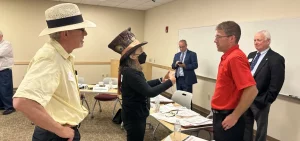News
Panel allows drilling on some Ohio-owned lands but delays vote on leases in state parks
By: Karen Kasler | Statehouse News Bureau
Posted on:
COLUMBUS, Ohio (Statehouse News Bureau) — As dozens of anti-fracking activists watched, an Ohio Department of Natural Resources panel voted to let companies bid on rights for drilling in four parcels of state-owned land. But the Oil and Gas Land Management Commission postponed voting on drilling in state parks to its next meeting.

The vote from the commission means drilling companies have the next three months to bid on the leases. When the open-bid period closes, the commission must then select the highest and best bid.
But votes on leases in Salt Fork State Park, north of Cambridge, Wolf Run State Park, south of Cambridge and Zepernick Wildlife Area, east of Canton, were tabled until the commission’s next session to allow time for some legal questions to be answered.
A spokesman with the Ohio Oil and Gas Association said that’s fine.
“There’s no rush here. We’ve been at this since 2011. And so it’s important to get it right and get it right the first time,” said Michael Chadsey, who was in the packed room for the meeting. “That will give them time to do their research and have their conversations and talk with the DNR and talk with the industry about how’s the best, what’s the best plan to move forward.”
While the decision to put off votes on leases for drilling in state parks may have seemed to be a relief to the activists, they aren’t pleased.
“I’m not happy because our campaign was to get denials on all the nominations – ODOT [land], the parks, the wildlife areas. So I’m not satisfied with that,” said Roxanne Groff with Save Ohio Parks. “To me, it just looks like a pathway to go ahead and do approvals on all the nominations.”
But commission chair Ryan Richardson said she doesn’t think state law allows the panel to block opening up state lands for oil and gas exploration.
“There is authority to disapprove, as I said during the meeting,” Richardson said. “But I feel like that the statute is pretty clear that it is only for the considerations that are in the statute that we have the authority to deny.”
Some of the nine things that are in that state law, Richardson said, are “open to additional debate and consideration,” which is why the votes were tabled. Those considerations include economic benefits, environmental or geological impact, impact to visitors or users of land or public comments.
Certain information about companies that hope to win the leases to drill on state land is confidential and can’t be disclosed at this point.
Some in the room called for the commission to allow public input. The public comment period on these nominations closed several weeks ago, and Richardson said this meeting was not the forum for comments.
“Certainly public comments are very important and something that we can and do consider,” Richardson said. “But our criteria is set out in the statute of what we’re supposed to consider with respect to individual nominated land.”
Richardson also briefly commented on the letters that came in supporting drilling with the names of people who didn’t authorize them or support it.
“As soon as those concerns were brought to our attention, we did share those with the attorney general’s office, which we think is the appropriate body to investigate those,” Richardson said. “There will be an investigation and so we will certainly cooperate with that and continue as we have to share any information that we have that might be relevant to their investigation.”
The next meeting of the Oil and Gas Land Management Commission hasn’t been set.
The state first allowed oil and gas exploration on state lands in 2011 under Gov. John Kasich, when the state was looking for new sources of revenue in what was estimated to be billions of dollars’ worth of oil and natural gas reserves in eastern Ohio. But a few years later Kasich was publicly opposed to drilling and fracking on state lands.
A law that passed during the lame duck session in December sought to speed up the process of permitting drilling on state lands by changing the language on state approval from “may” to “shall.” It also declared natural gas “green energy,” though it’s mostly methane.
Gov. Mike DeWine has said he signed the law because it just modified the existing statute allowing drilling on state lands, but “as long as I’m governor, we’re not going to drill in state parks.” But DeWine has also said horizontal drilling underneath a park from land outside of it is “a very different thing than going into the state park itself.”

